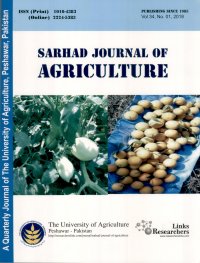Climate Change is Real and Relevant for Sustainable Development, An Empirical Evidence on Scenarios from North-West Pakistan
Climate Change is Real and Relevant for Sustainable Development, An Empirical Evidence on Scenarios from North-West Pakistan
Arjumand Nizami1, Jawad Ali2 and Muhammad Zulfiqar3
ABSTRACT
This study is based on empirical data on temperature and rainfall change from Khyber Pakhtunkhwa region of North-West Pakistan to illustrate that climate change is no longer theoretical. It is real and becoming self-evident. Climate assessment 1981-2010 and future scenario 2010-2040 for KP noted little shifts in the annual average rainfall. However seasonal shifts are rather significant. In all the districts, spring and summer rains are showing an increasing trend whereas fall and winter rains are continuously declining. This shows that spring and summer are becoming wetter and fall and winter are becoming dryer till 2040. Nearly two-third or more of the total rains are received during spring and monsoon. In decadal scenario, it is likely that annual average precipitation will continue to increase till 2030 and start declining during 2030-2040 in all the seasons. The temperature scenarios also present a noticeable change. An average increase in temperature in KP is 1.80C during 2010-2040. In the Northern districts (mountain areas) it is the 1.90C closely followed by Central with 1.80C and the South 1.60C (where South is already a heat surplus zone). These trends are crucial in terms of disasters with likelihood of spring / monsoon floods and winter drought.
To share on other social networks, click on any share button. What are these?








